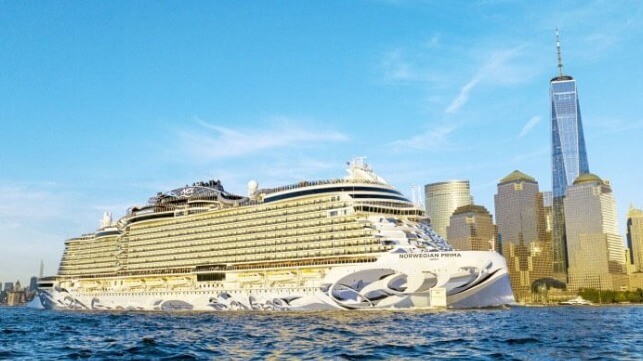Norwegian Cruise Line Holdings Proceeding with Methanol Tests

Norwegian Cruise Line and its parent company are pursuing green methanol as their preferred path to achieve decarbonization of their operations. While Carnival Corporation, MSC Cruises, and Royal Caribbean Group all are introducing liquified natural gas ships to their fleet, Norwegian has decided to pursue methanol while implementing interim steps on its in-service cruise ships.
The cruise line holding company earlier this year joined the Methanol Institute, the trade association for the emerging methanol industry, and is now planning a number of efforts to test the use of methanol and incorporate it in the future on its cruise ships. To that end, Norwegian Cruise Line Holdings, the publicly-traded parent company of the cruise lines, recently signed an agreement with MAN Energy Solutions for a project to retrofit a medium-speed MAN 48/60 engine to make it capable of dual-fuel diesel/methanol operation.
The Memorandum of Understanding provides for a multi-stage project studying the feasibility of methanol operations for the cruise ships. Norwegian Cruise Line Holdings currently operates a total of 29 cruise ships across its three brands with an additional eight ships currently on order and due for delivery by 2027. According to MAN, the third and final stage of the planned project involves the completion of field testing of the dual-fuel engine capable of methanol operations and engine handover to NCLH for commercial operation.
Speaking with the media in New York during the U.S. introduction of the cruise line’s new ship Norwegian Prima, Harry Sommer, President of Norwegian Cruise Line, reported that the cruise line is planning tests and looking to install methanol tanks on some of its cruise ships. He suggested that the company might start by operating ships with methanol when in port while also looking to incorporate methanol-ready tanks into their future cruise ships. He noted the challenges of retrofitting tanks to the company’s existing ships.
In addition to Norwegian, Germany’s TUI Cruises is also pursuing methanol as a future alternative fuel for its cruise ships. In June, work began at Meyer Turku to build the Mein Schiff 7, which will be the first newbuild cruise designed to be methanol-ready. The 111,500 gross ton cruise ship, which is due to enter service in 2024, will be able to operate on methanol or bio-methanol when the fuel becomes available.
According to Sommer, fuel availability is one of the major hurdles to Norwegian’s efforts to adopt alternative fuels for its cruise ships. With the growth of methanol in the commercial sector of the industry, the expectation is that methanol will become increasingly available. Sommer said that he expects the supply of green methanol will grow in the next few years. He noted that they have also discussed hydrogen fuel cells with shipyards but that the fuel supply is yet to be developed.
In the interim, Norwegian Cruise Line is using currently available technology to improve the performance of its cruise ships. The Norwegian Prima (143,500 gross tons) while the same volume as the company’s older cruise ships was fitted with more efficient Azipod propulsion using less power and improving fuel efficiency. The ship also meets the new regulations with emission scrubbers addressing both SOx and NOx exhausts. The cruise line is using low sulfur fuels and its new ships are also outfitted with shore power capabilities.

that matters most
Get the latest maritime news delivered to your inbox daily.
Norwegian also plans to begin testing the use of biodiesel fuels on its cruise ships. Sommer noted that the fuel is compatible with no required structural changes for the tanks and engines. He said that biodiesel is close to zero emission on a well-to-wake measure and they are hopeful that the tests will provide a near-term path for the company. Other cruise lines, including AIDA and Holland America Line, recently also performed the first biodiesel tests in the cruise industry while it has been widely tested in the commercial sectors and adopted by several major shipping companies.
Norwegian Cruise Line Holdings expects to make large investments according to CEO Frank Del Rio to pursue its goal of net zero greenhouse gas emissions by 2050. Speaking to investors, Del Rio also reiterated the corporation’s belief that methanol is today the best solution for decarbonization for the company’s cruise ships.
